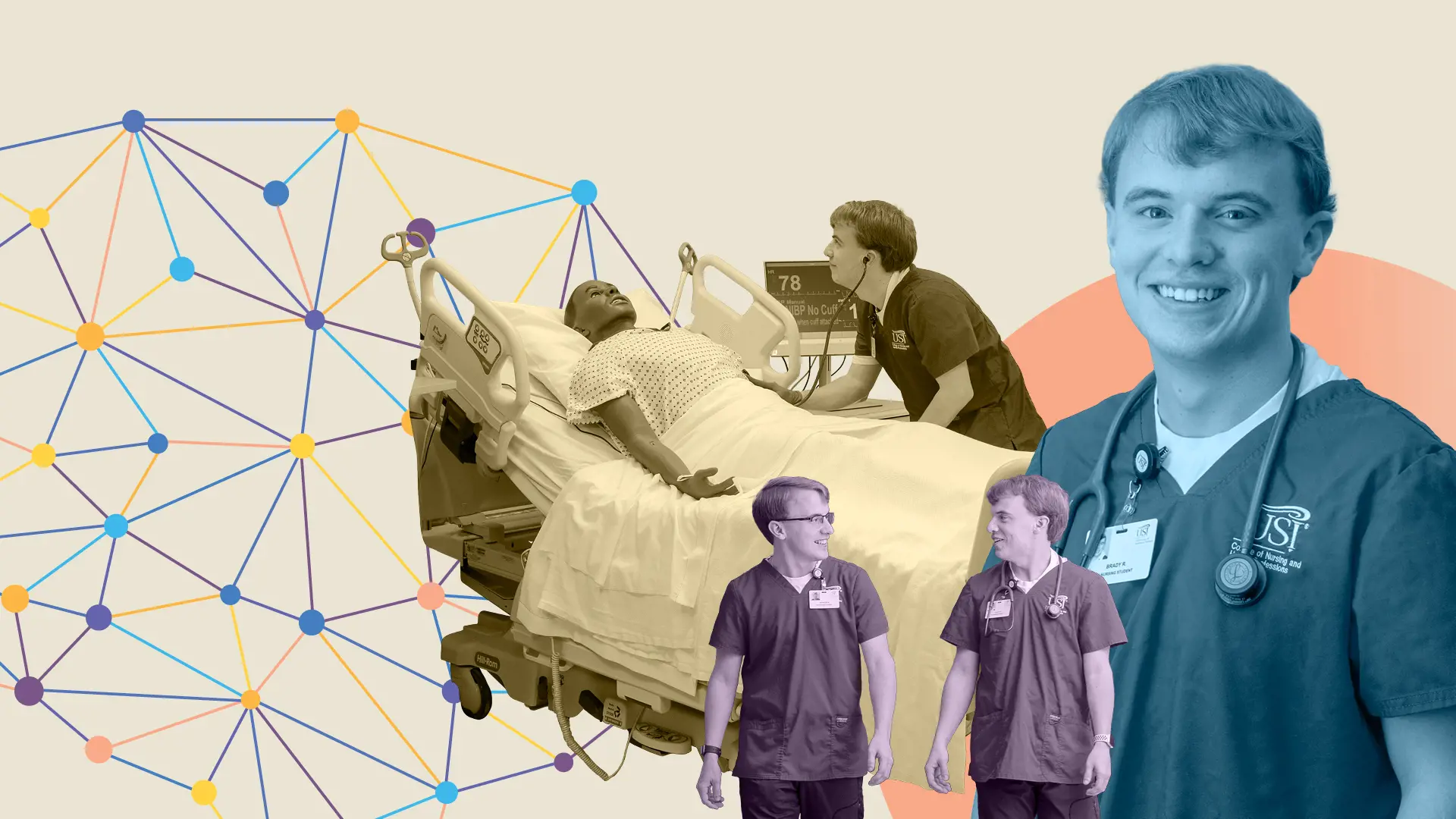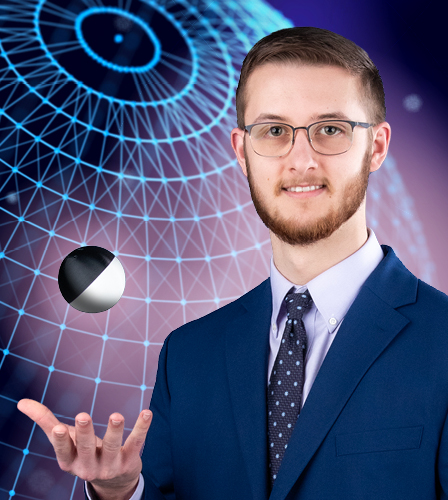A Healing Course

A Healing Course: From NICU to Nursing
by Mary T. Scheller
When Brady Robinson '25 was only 13 months old, a serious medical condition landed him in the hospital. Luckily, healthcare providers were able to give him a second chance at life. This turn of events set him on a trajectory to follow in the footsteps of his providers by enrolling in the USI Nursing Program, so he can one day help others.
Brady is one of three triplet boys (two identical, one fraternal) born in 2002 in Greencastle, Indiana, five weeks before their due date. From the start, there were signs that Brady would face more health challenges than his brothers. "When I was in the NICU*, the scans and records indicated that I had a small brain bleed," he says. "They said this was probably due to prematurity and not due to another disease or illness, and it was noted on my records and our pediatrician was notified."
Nine months later, however, the Robinson parents were alarmed when their pediatrician noticed Brady's forehead seemed larger than normal. Because brain bleeds can lead to hydrocephalus, a condition where fluid builds up on the brain, the quick-thinking doctor referred young Brady to a neurosurgeon at Riley Hospital for Children in Indianapolis where a diagnosis of hydrocephalus was confirmed and surgery was required.
"If left untreated, hydrocephalus can be fatal, so I'm very thankful our pediatrician told my parents to take me to Riley," says Brady. "During my first brain surgery there, the surgeon implanted a ventricular placement (VP) shunt in my brain—a permanent implant—to drain the excess cerebrospinal fluid. The surgery took around eight hours to be completed."
Brady was too young to understand what was going on back then, but now, as a senior nursing major at USI, he understands the impact that hospital and neurosurgeon had on his life. "If I could talk to him, I would give him all the praise in the world," says Brady. "He has inspired me to provide the same type of care for my patients and their families. The amount of sacrifices he gave to be there late at night or early in the morning, making sure I was healthy following the surgery, and checking on my family, means the world to me now."
Unfortunately, Brady's first surgery would not be his last. In 2011, when he was in second grade, the shunt in his brain malfunctioned, which caused him to have a terrible headache, vomiting and dizziness. He told his parents he just needed to sleep it off, but as the day went on, his symptoms only worsened. The entire family, including Brady's grandmother, quickly packed their bags and made the one-hour drive to the Riley emergency room.
During that hospital stay, he endured three lengthy brain surgeries back-to-back because of complications encountered while inserting a new shunt.
Three years later, when he was in the fifth grade, the very same symptoms—headache and vomiting— returned with a vengeance, all due to problems with his shunt. He remembers being terrified to return to the emergency room at Riley, and this time, at 11-years-old, he was old enough to be more aware of the seriousness of his medical condition.
"Even though I was young, I knew several medical terms already, so I began to understand what was about to come," he says. "Just overhearing a nurse tell someone 'The OR has been contacted' brought me to tears."
For a fifth time, Brady was rushed to the Riley operating room where his life was in the hands of the same neurosurgeon who had performed his previous shunt surgeries. This time, the entire shunt system in his brain was replaced with a programmable shunt, which is the one he still has today, to prevent fluid buildup.
Over the years, Brady returned to Riley for frequent check-ups, and he has also seen specialists there to monitor his kidney function. "In addition to brain bleeds, premature babies are at a higher risk of chronic kidney disease," he explains. "I was diagnosed with this when I was 3 years old. My kidneys are small but still functioning. If I get to the point where I need a kidney transplant, my identical twin brother, Marcus '25, is a perfect match!"

As a sibling, Marcus was impacted by the nurses he encountered at Riley. "I remember being so scared when the doctors would come into the room and tell us things about Brady's condition that we didn't understand," he says. "The nurses would always stick around afterwards to answer our questions and make sure we had everything we needed. They didn't just take care of Brady. They cared for our entire family."
Brady and Marcus are both seniors in the USI Nursing Program. They agree the time their family spent at Riley ignited their interest in nursing careers, along with encouragement from their parents. Their dad is an Indiana State Trooper, and their mother is a former public safety dispatch officer, so growing up, the boys were aware of the importance of essential healthcare workers during emergency situations. They both chose USI because of the Nursing Program's reputation and high pass rates on the licensure exam required for registered nurses.
While working as a student nurse at the hospital, Brady often thinks back on his own journey when he encounters young patients. "Knowing just how smart some pediatric patients can be from their experiences in the hospital has allowed me to better improve my communication skills," he says. "I try to talk with kids in a way that is honest, but also explained at a level they can understand that won't be too traumatizing. My parents were always honest with me as we were heading to the emergency room. They would tell me there may be something wrong while also assuring me I had a great team of doctors to get it figured out."
Brady says that he and his brother have both forged strong friendships in the Nursing Program to help them survive the ups and downs. "Nursing is a tough field, and I knew that going into it," says Brady. "We have a solid friend group, and our study group sessions are something I will forever carry with me after graduation."
Brady and Marcus will graduate with their Bachelor of Science in Nursing degrees on the same day as their brother, Craig, who is majoring in English education with a theater minor at another college in central Indiana. The identical twins have accepted identical jobs as emergency room nurses at the same Evansville hospital.
"We will be employed at the same hospital where we began our first medical jobs as techs," says Brady. "This is where we got our foot in the door as healthcare workers and had some clinical experience. The staff there are very welcoming and lend helping hands where needed. Plus, the Evansville area has brought way more than lasting friendships. Through friends, school, work and church, we have found second families."
Now that Brady is preparing to graduate from USI, he has also graduated from Riley. The specialists he has seen there have told him it is time to move on to an "adult" hospital. But his heart will stay at Riley, and his dream is to one day work as a nurse at the same emergency room in Indianapolis where he endured so many anxious hours as a child. "The time I spent at Riley had such an impact on me," he says. "I still remember my 'favorite' nurses. They were the ones who had the most compassion and who were kind to me and my family. When you are in the hospital, you never know what type of nurse will walk through the door to take care of you. I strive to be the type of nurse my patients look forward to seeing!"
The Power of the Dance
Because they are identical twins, Brady and Marcus Robinson seem to be everywhere at USI. The USI nursing majors have been involved in many of the same campus activities, including being peer advisors and student ambassadors, which can cause some confusion and cases of mistaken identity. Marcus wears glasses instead of contacts most of the time to make it easier for USI faculty and clinical instructors at the hospital to tell them apart.
Among the many organizations they've been involved with, the Southern Indiana Dance Marathon (SIDM) holds a special place in their hearts because it raises money for Riley Hospital for Children, which is part of the Children's Miracle Network Hospitals. The USI Dance Marathon has been a student-led philanthropic movement at USI since 2010, and the money raised for Riley Hospital supports groundbreaking pediatric research; patient programs in need of additional funding; maternity and newborn health; and family support programs, such as child life and social work.

The Robinsons, and other members of the SIDM executive committee, spend months planning the multi-hour USI Dance Marathon, which, despite the name, involves much more than just dancing. There is also food, games and appearances from local Riley families who share their patient stories on stage. USI students are encouraged to raise money for the Riley Children's Foundation via an online fundraising website, and the donation total is announced at the end of the evening. In 2024, they were rewarded for their efforts when SIDM received the Campus Impact Award during the USI Center for Campus Life Student Organization Celebration.
Brady, who is a "Riley kid," describes the Dance Marathon movement as a "cause greater than ourselves" and "nothing short of powerful." Brady and Marcus Robinson
"We as college students attend classes, hang out with friends and take every day we have for granted. Dance Marathon helps open our eyes and allows us to see what we have to be grateful for and what we can do with our time—specifically here at USI—to leave an impact on kids who need it," Brady says. "I have been in their shoes, so this is a way for me to give something back. I would tell anyone, no matter their background, to give Dance Marathon a chance. This organization can shape your future and bless others in ways that can change their lives. Dance Marathon uses the message of staying on your feet for those who can't and builds connections within the USI community."







